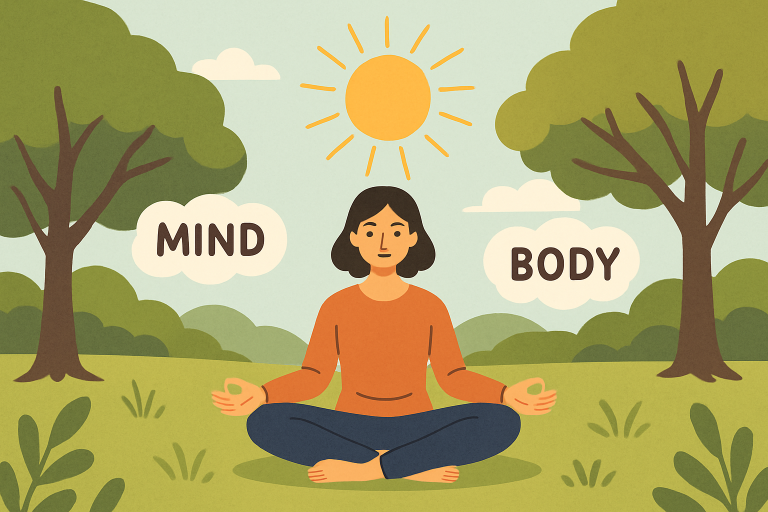Key Takeaways
- Holistic mental health strategies address the mind, body, and spirit to promote overall well-being.
- Practices such as yoga, mindfulness, and proper nutrition have been shown to alleviate symptoms of anxiety and depression.
- Integrating holistic methods with traditional treatments can enhance recovery and resilience.
Understanding Holistic Mental Health
Holistic mental health recognizes that wellness comes from a balance within the mind, body, and spirit. Unlike conventional approaches that focus on treating symptoms in isolation, holistic care considers the individual’s physical habits, emotional state, relationships, and even environment. This perspective acknowledges that each area of life impacts overall mental well-being—and that addressing challenges on multiple fronts can lead to lasting change. The journey toward comprehensive wellness often begins by understanding personal needs and exploring practices that suit one’s unique lifestyle and values.
To learn more about how whole-person strategies can support your journey, consider connecting with New Harbor Behavioral Healthcare, which specializes in integrated mental health programs. This kind of support can help you tailor practices to your specific life circumstances and goals, ensuring that your wellness plan is meaningful and sustainable over time.
A holistic approach emphasizes the connection between everyday habits—such as getting sufficient sleep, spending time in nature, and fostering positive relationships—and our resilience against stress and adversity. Growing awareness of these links has led to increased interest in practices that focus not only on mental symptoms, but also on physical and spiritual health.
According to experts cited in publications such as Psychology Today, integrating mind, body, and emotional self-care offers benefits that extend far beyond the absence of illness, instead supporting a thriving and balanced life.
Yoga: A Path to Inner Peace
Yoga is more than a physical workout—it’s a comprehensive practice rooted in ancient traditions that fosters a connection between the body and mind. Through intentional movement, structured breathing, and meditation, yoga offers powerful tools to manage stress, calm the mind, and cultivate mental clarity. Research highlighted by the Harvard Health Blog suggests that regular yoga practice significantly lowers anxiety and depressive symptoms, in part by reducing levels of cortisol, the “stress hormone,” and boosting natural mood-enhancing endorphins.
Incorporating yoga into your daily or weekly routine doesn’t require experience or special equipment. Many community centers and online platforms offer classes suitable for all skill levels. With consistency, the mindfulness, flexibility, and calming effects fostered by yoga can help support lasting mental wellness.

Mindfulness: Cultivating Present Awareness
At its core, mindfulness is the practice of engaging fully with the present moment, acknowledging thoughts and emotions without judgment. This process enables individuals to develop greater self-awareness and emotional regulation. Studies have demonstrated that mindfulness meditation can significantly reduce symptoms of anxiety and depression, making it a valuable tool for improving mental health.
Incorporating mindfulness doesn’t have to be complex—it can begin with just five minutes a day of focused breathing or a short guided meditation. Over time, these small moments of awareness build emotional stability, help break cycles of negative thinking, and foster greater resilience to stress.
Nutrition: Fueling the Mind and Body
What we eat plays a profound role in how we feel. Diets rich in colorful fruits and vegetables, whole grains, lean proteins, and healthy fats provide essential nutrients that affect our brain chemistry and mood. For example, omega-3 fatty acids, found in foods like salmon, walnuts, and flaxseeds, have been linked to reduced symptoms of depression and improved cognitive function. Emerging evidence suggests that prioritizing gut health through the consumption of probiotics and fiber-rich foods can also have a positive impact on mental health by supporting the gut-brain axis.
Establishing healthy eating habits, such as planning balanced meals and staying hydrated, lays a solid foundation for holistic mental wellness. If implementing nutritional changes feels challenging, consider consulting a nutritionist specializing in mental health for guidance tailored to your specific needs.
Integrating Holistic Practices with Traditional Treatments
For many, the most effective mental health care involves blending holistic practices with conventional therapies like counseling or medication. Treatment plans that incorporate mindfulness, movement, and nutritional guidance can help individuals recover more fully and reduce the likelihood of relapse. In fact, research shows that combining these tools can improve outcomes for those living with anxiety, depression, and trauma, addressing not only the symptoms but also the root causes of distress.
Working with a therapist or behavioral healthcare provider who is open to integrative strategies can ensure that all aspects of well-being are addressed in your recovery journey, empowering you to develop resilience and reconnect with your sense of purpose and joy.
Real-Life Applications of Holistic Strategies
Community programs such as “Awaken” illustrate how integrated approaches deliver practical, life-changing benefits. By offering personal development workshops, mindfulness sessions, and career coaching, these programs help participants manage stress, build confidence, and navigate both personal and professional challenges more effectively. The holistic tools and peer support provided by such initiatives inspire lasting transformation and growth.
Holistic strategies aren’t limited to formal programs; they can be woven into daily life through small, meaningful habits—like starting the day with gratitude, taking mindful walks, or preparing nutritious meals. These actions, individually and collectively, can lead to profound improvements in overall well-being.
Conclusion
Holistic approaches provide a comprehensive, empowering path to mental wellness by acknowledging that the mind, body, and spirit are deeply interconnected. Integrating yoga, mindfulness, and nutrition, supported by proven clinical evidence, can establish a balanced foundation for lifelong mental health. Exploring these practices not only aids recovery from mental health challenges but also enriches daily life, fostering true fulfillment and resilience in the face of adversity.

